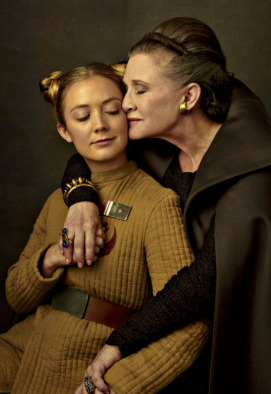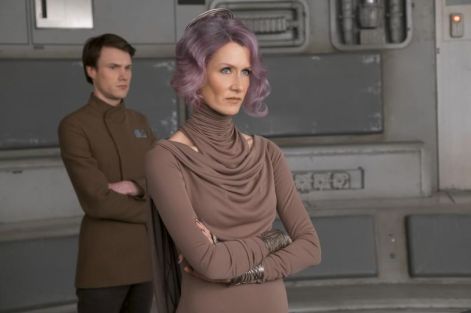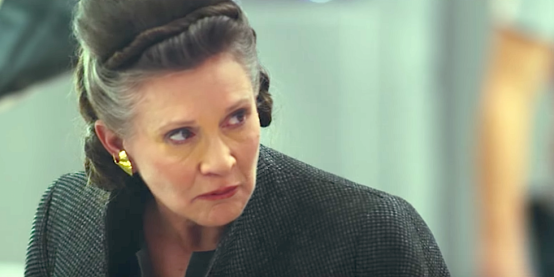
Carrie Fisher and her daughter, Billie Lourd, as General Leia and Lieutenant Connix, in a PR shot for The Last Jedi taken by Annie Leibovitz for Vanity Fair
NOTE: Many spoilers.
My feed (and yours, I presume) has been filling with people, mostly men, denouncing The Last Jedi for all sorts of reasons. Here are a few I compiled out of my own feed over the past week:
It’s too draggy and long
It’s too fast-paced
It is magically both draggy and fast-paced
It’s too much about one family
It’s not about family
The plot is terrible
The plot is fine but the acting is terrible
The plot and acting are fine, but the pacing is terrible
The plot, acting, and pacing are fine but the characterizations are terrible
It needed more humor
It needed less humor
It needed a different kind of humor
Not enough character development
Too much character development
The stakes were too low
The stakes were too high
It’s too much like the original trilogy
It’s not enough like the original trilogy
Hm.
Usually, when a film is genuinely bad, we’re all in agreement about at least a few areas of obvious badness. There’s not much controversy about the general awfulness of Jar Jar, Hayden Christiansen’s acting, or the wooden love scene dialogue of the prequels. Sure, there’s the occasional outlier insisting they love Jar Jar, but on the main, these are obvious, agreed-upon flaws. Yet there’s no agreement about The Last Jedi. Instead, I’ve seen dozens of contradictory opinions, and at least half of them are stated like this:
“I’m fine with female-driven films, but I just hate this particular one for reasons.”
The Last Jedi has become the Hillary Clinton of filmmaking.
Yes, WE ALL KNOW YOU HAVE REASONS. So many reasons, all of which were no problem when they were part of male-driven films, but are now somehow egregious, film-ruining faults. And yes, we know you all know a real, actual human female who ALSO TOO did not like TLJ so HOW COULD THIS POSSIBLY BE ABOUT GENDER EVER QED.
It’s about gender.
And, because these issues are intersectional, it’s also about race. Here’s why so many men hate The Last Jedi and– not coincidentally– why I love it.

Kelly Marie Tran as Rose Tico in The Last Jedi
ROSE TICO. Kelly Marie Tran, the actress who plays Rose Tico, has been harassed and threatened by angry internet men, so this seems like an obvious place to start. What do so many men hate and fear about Rose Tico? In short, Rose Tico is played by a woman of color and isn’t constructed solely to please the men in the audience. She wears practical work clothes, not Hollywood’s version of “practical work clothes” for women (skin-tight coveralls with a low-cut top). The camera didn’t linger over her ass as she bent over; she doesn’t suggestively hold her tools. She’s not presented as women are usually presented– from the straight male characters’ point of view, as a proxy for the straight male audience members’ point of view. Forthright, awkward, brilliant Rose Tico is presented as a real, well-rounded person exactly the way we portray male characters. For a woman of color in a mainstream film, this is remarkable.
MORE ROSE TICO. Because she wasn’t shown through Finn’s point of view, the subplot didn’t then become about Finn trying to “win” her, making it feel pointless to people who see a male/female pairing and expect that dynamic. Instead of seeing it as “buddies race against the clock while facing impossible odds,” a very common trope even just in Star Wars films alone (GET THAT SHIELD DOWN), they saw it as a pointless diversion. If Rose had been a male character, this subplot would have gone as unremarked as every other time it’s been used in decades of filmmaking. Because she’s a woman who isn’t presented as an event in the life of a man, she’s everything from a flaw in the filmmaking to an affront to fragile masculinity.
EVEN MORE ROSE TICO. When Rose declares her love for Finn, people complained because it wasn’t presented the way we have come to expect– telegraphed through presenting the female character as the object of male desire. Because she wasn’t objectified through Finn’s admiring gaze, their relationship has been criticized for “lack of sexual tension” and a “lack of chemistry.” If he had been chasing her throughout the film, her declaration of love would have fit neatly into the sexist trope of men “winning” women. Instead, her declaration of love comes as a surprise, but this, again, is an extremely common trope in filmmaking– when the declaration comes from a man. If the sudden declaration of love had come from Finn, it would have passed as unremarked as it has been in literally thousands of films.

Vice Admiral Holdo (Laura Dern) with her first officer (Hugh Skinner)
VICE ADMIRAL HOLDO. There’s nothing particularly unusual about this character, the way she’s used, or her sacrifice apart from her gender. “Why is this random character suddenly in charge? Do we trust them?” could be the plot description of thousands of Hollywood films, but when the character is a woman, it’s suddenly a flaw in the filmmaking. “Why is Holdo’s sacrifice seen as brave and Finn’s seen as foolhardy?” The parallel sacrifice to Holdo is Luke, not Finn. Luke sacrifices himself to allow what’s left of the Resistance to escape, just as Holdo sacrificed herself earlier to stop the First Order from picking off Resistance shuttles one by one, allowing the survivors to escape. The parallel sacrifice to Finn is Poe sacrificing the entire Resistance bomber fleet. Both Poe and Finn ignore orders from women to stand down and escape in favor of chasing glorious, but pyrrhic, victories.
The Last Jedi spends an enormous amount of time and care on the theme “sometimes escape is the more sensible option, and glorious victories too often come at such a high cost they become failures.” Women in the Resistance are constantly fighting against cocky young men chasing glory, constantly trying to save lives that these cocky young men would sacrifice for that glory. This is a film that sees glorious sacrifice as a last resort and escape as a pragmatic and sensible choice. This is a film about discretion being the better part of valor. It doesn’t take much analytical skill to see why some men are so upset by that, and Holdo is one of the characters at the center of that narrative. The other is Leia.

Carrie Fisher as Leia in The Last Jedi
LEIA. I brought a handkerchief to this film specifically because I knew in my heart I would have to watch Leia die due to the loss of the irreplaceable Carrie Fisher. When Leia survived the bridge of her ship shattering, no one was more surprised than I was. The angry male internet was, evidently, outraged because “suddenly” Leia could use the force. Leaving aside the entire EU— the film certainly does– Leia is Luke’s twin sister and uses the force in Empire Strikes Back, The Force Awakens, and The Last Jedi. TLJ is careful to show her taking a breath to prepare the moment before the bridge is shattered, and the effort nearly kills her. In the original trilogy force ghosts, space stations that have the power to destroy planets, and people with powerful telekinetic abilities who still somehow need to fight with swords are all accepted without a peep. A world with exactly zero female pilots, techs, or ground troops is accepted without a peep. A world where Biggs Darklighter’s mustache makes sense is accepted without a peep. But Leia, twin sister to the most powerful Jedi who ever lived, using the force to save her life is evidently a film-ruining moment. Any woman strong in the force without male oversight is a problem for the angry male internet, which brings us to Rey.
REY. The most common complaint from the angry male internet is “REY IS TOO POWERFUL.” She is no different than Luke was in the original trilogy in that respect. She is naturally gifted in the force, just as Luke was, yet Luke’s power is accepted without complaint while Rey is begrudged hers. Luke, a farm boy with no fighting experience, receives a bit of training from Yoda that seemingly contains zero combat skills, then leaves before his training is complete, but is still somehow able to stand against Vader for a lengthy lightsaber battle before escaping. Rey begins TFA at least knowing something about fighting, and is shown practicing with a lightsaber in TLJ. Yet once again, where Luke’s combat prowess was unquestioningly accepted, Rey’s is held up as a flaw in the filmmaking.
FINN AND POE. There’s much to be said about race in the new trilogy. We can always do better, but the diverse Lucasfilm story team, currently headed by a woman of color, is pushing everything in the right direction. What I consider to be the “right direction” is definitely at odds with a sizable number of white men. You’ll see white men all over the Resistance as pilots, techs, bridge officers, and soldiers, but because there are no white male leads by the end of the film but villains, many white men have complained they are being pushed out of the series entirely. They forget that, even now, the vast majority of films star white men, and women and people of color are expected to enjoy those films despite a lack of representation. When women and people of color discuss issues of representation, they’re denigrated as “feminazis,” “snowflakes,” and “whiners,” and even met with harassment, threats, and coordinated attacks like Gamergate. Many white men see themselves as rightfully at the center of all narrative, and believe any narrative that doesn’t feature them as heroes, even when they are featured in supporting roles, has displaced them.

Oscar Isaac as Poe and John Boyega as Finn in a PR shot for The Last Jedi shot by Annie Leibovitz for Vanity Fair
While not every white man who dislikes The Last Jedi overtly dislikes its gender balance or diversity, many feel a level of discomfort with this film that they can’t name, and that expresses itself through a wide variety of odd, conflicting complaints about its filmmaking.
What solidifies this for me is the apparent need for men to publicly pronounce their dislike of the film. Hollywood releases dozens of mainstream films a year, and the only films I’ve seen men rush en masse to publicly criticize in the past few years, all for their “flawed filmmaking,” were the all-female Ghostbusters, Mad Max: Fury Road, Wonder Woman, and The Last Jedi. I saw hundreds of men openly loving deeply flawed projects like Stranger Things, Deadpool, and the Blade Runner remake. We all love things that are sloppily constructed, politically problematic, or internally inconsistent. Hell, Hamlet is all three of those and you’ll have to pry Shakespeare from my cold, dead hands. But when you see thousands of men all rushing to the internet to publicly denounce something for its “flaws,” all of which contradict each other and all of which are routinely tolerated in male-driven films, including the original Star Wars trilogy itself, something else is afoot.
I don’t think every human who disliked The Last Jedi is an evil, evil misogynist. I do think that we have so deeply internalized sexist narrative tropes that we see them as “correct” and “good filmmaking” while seeing their absence as “flaws.” We read female characters differently than male characters, and we have internalized expectations for female character arcs. Instead of seeing this film for what it is, people are criticizing it for not conforming to the expectations they have of female characters. It’s fine to dislike something, but we should all spend a little more time thinking deeply about why before we charge onto the internet with “I’m fine with female-driven films, BUT . . .”

Rey on Ahch-To in The Last Jedi